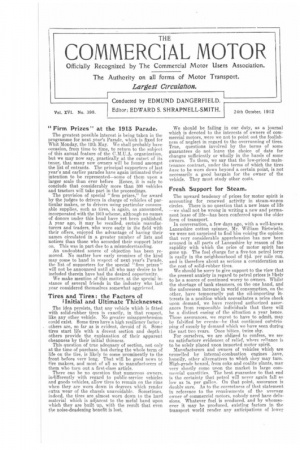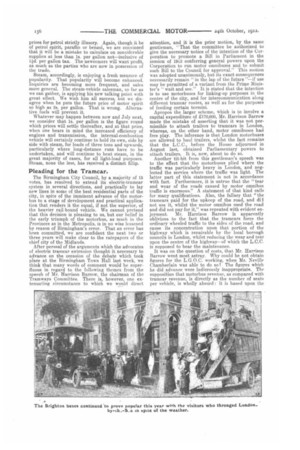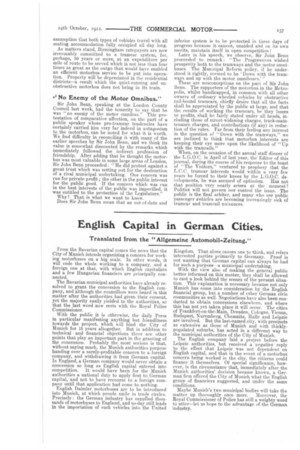"Firm Prizes" at the 1915 Parade.
Page 1

Page 2

Page 3

If you've noticed an error in this article please click here to report it so we can fix it.
The greatest possible interest is being taken in the programme for next year's Parade, which is fixed for Whit Monday, the 12th May. We shall probably have occasion, from time to time, to return to the subject of this annual feature of the O.M.T_T.A. organization, but we may now say, practically at the outset of its tenor, that many new owners will be found amongst the list of entrants. The principal supporters of last year's and earlier parades have again intimated their intention to be represented—some of them upon a larger scale than ever before Hence, it is safe to conclude that considerably more than 300 vehicles and tractors will take part in the proceedings. The provision of special " firm prizes," for award by the judges to drivers in charge of vehicles of particular makes, or to drivers using particular consumable supplies, such as tires, is again, as announced, incorporated with the 1913 scheme, although no names of donors under this head have yet been published. A year ago, it may be recalled. certain manufacturers and traders, who were early in the field with their offers, enjoyed the advantage of having their names circulated in a greater number of lists and notices than those who accorded their support later on. This was in part due to a misunderstanding.
An undoubted source of objection has been removed. No matter how early promises of the kind may come to hand in respect of next year's Parade. the list of supporters for the special " firm prizes" will not be announced until all who may desire to be included therein have had the desired opportunity. We make mention of this matter, at the special instance of several friends in the industry who last year considered themselves somewhat aggrieved.
Tires and Tires : the Factors of I Initial and Ultimate Thicknesses.
The idea persists, that any vehicle which is fitted with solid-rubber tires is exactly, in that respect, like any other vehicle. No greater misapprehension could exist. Some tires have a high resiliency factor ; others are, so far as is evident, devoid of it. Some tires start life with a decent section and depth : others provide the explanation of their apparent cheapness by their initial thinness.
This question of true adequacy of section, not only at the time of purchase. but during the whole term of life on the tire, is likely to come prominently to the front before very long. That will be good news to tire makers, and most of all so to manufacturers of them who turn out a first-class article.
There can be no question that numerous owners, indifferently with regard to public-service vehicles and goods vehicles, allow tires to remain on the rims when they are worn down in degrees which render extra wear of the chassis unavoidable. Sometimes. indeed, the tires are almost worn down to the hard material which is adjacent to the metal band upon which they are built up, with the result that even the noise-deadening benefit is lost,
We should be failing in our duty, as a journal which is devoted to the interests of owners of commercial motors, were we not to point out the foolishness of neglect in regard to the overrunning of tires. True, questions involved by the terms of some guarantees do not leave the choice of date for changes sufficiently or wholly in the hands of some owners. To them, we say that the low-priced maintenance contract, under the terms of which the tires have to be worn down beyond a certain point, is not necessarily a good bargain for the owner of the vehicle. They must study other costs.
Fresh Support for Steam.
The upward tendency of prices for motor spirit is accounting for renewed activity in steam-wagon circles. There is no question that a new lease of life —we shall not be wrong in writing a new and permanent lease of life—has been conferred upon the older form of transport.
In conversation, a few days ago, with a well-known Lancashire cotton spinner, Mr. William Hirtwistle, we were not surprised to find him voicing the opinion that very considerable apprehension has now been aroused in all parts of Lancashire by reason of the rapidity with -which the price of motor spirit has gone up. The fuel charge for a five-ton petrol lorry is easily in the neighbourhood of 2id. per mile run, and is therefore about as serious a consideration as the cost of solid-rubber tires.
We should be sorry to give support to the view that the present anxiety in regard to petrol prices is likely to be a source of continued worry to owners. Whilst the shortage of tank steamers, on the one hand, and the unforeseen increase in world consumption, on the other, have temnorarily put the oil-importing interests in a position which necessitates a. price cheek upon demand, we have received authorized assurances from responsible individuals that there will be a distinct easing of the situation a year hence. Those assurances, we regret to have to admit, may be falsified by events—by that continued outstrin ping of supply by demand which we have seen during the past two years. Once bitten, twice shy.
For ourselves, we are obliged to confess, we see no satisfactory evidences of relief, where reliance is to be solely placed anon imported motor spirit. Mannfactarers and owners of vehicles which are nropelled by internal-combustion engines have, happily, other alternatives to which they may turn. High-grade benzol, ?ram coke and coalite plants, may very shortly come unon the market in large cornmereial quantities. The best guarantee to that end is the certainty that petrol will never again fall so low as is. per gallon. On that point, assurance is doubly sure. As to the correctness of that statement in reference to the renuirements of the average owner of commercial motors, nobody need have delusions. Whatever fuel is produced, and by whomsoever it may be produced, existing factors in the transport world render any anticipations of lower
prices for petrol strictly illusory. Again, though it be of petrol spirit, paraffin or benzol, we are convinced that it will he a mistake to calculate on considerable supplies at less than Is, per gallon net—inclusive of lid. per gallon tax. The newcomers will want profit, as much as the parties who are now in possession of the trade.
Steam, accordingly, is enjoying a fresh measure of popularity. That popularity will become enhanced. Inquiries are becoming more frequent, and sales more general. The steam-vehicle salesman, so far as we can gather' is applying his new talking point with great effect. We wish him all success, but we disagree when he puts the future price of motor spirit so high as 2s. per gallon. That is wrong. Alternative fuels will prevent it.
Whatever may happen between now and July next, we consider that is. per gallon is the figure round which prices will settle thereafter, and at that price, when one bears in mind the increased efficiency of engines and transmission, the internal-combustion vehicle will certainly continue to hold its own, side by side with steam, for loads of three tons and upwards, particularly where long-distance runs have to be undertaken, and will continue to beat steam, in the great majority of cases, for all light-load purposes. Steam, none the less, has received a distinct fillip.
Pleading for the Tramcar.
The Birmingham City Council, by a majority of 15 votes, has resolved to extend its electric-tramcar system in .several directions, and practically to lay new lines in some of the best residential parts of the city, in spite of the imminent advance of the motorbus to a stage of development and practical application that renders it the equal, if not the superior, of the heavier rail-bound vehicle. We cannot pretend that this decision is pleasing to us, but our belief in the early triumph of the motorbus, as much in the Provinces as in the Metropolis, is in no wise lessened by reason of Birmingham's error. That an error has been committed, we are confident the next two or three years will make clear to the ratepayers of the chief city of the Midlands.
After perusal of the arguments which the advocates of electric tramcar extension thought it necessary to advance on the occasion of the debate which took place at the Birmingham Town Hall last week, we think that massy words of comment would he superfluous in regard to the following themes from the speech of Mr. Harrison Barrow, the chairman of the Tramways Committee. There is, however, one extenuating circumstance to which we would direct attention, and it is the prior motion, by the same gentleman, "That the committee be authorized to give the necessary notice of the intention of the Corporation to promote a Bill in Parliament in the session of 1913 conferring general powers upon the Corporation to run motor omnibuses and to submit such Bill to the Council for approval." This motion was adopted unanimously, but its exact consequences necessarily remain "in the lap of the future' —if use may be permitted of a variant from the Prime Minister's "wait and see." It is stated that the intention is to use motorbuses for linking-up purposes in the centre of the city, and for intercommunication along different tramcar routes, as well as for the purposes of feeding certain termini. Apropos the larger scheme, ivhich is to involve a capital expenditure of £170,000, Mr. Harrison Barrow made the mistake of asserting that it was not permissible to attach trailers to tramcars in London, whereas, on the other hand, motor omnibuses had free play. The inference is that London motorbuses are allowed to haul trailers, whilst the fact remains that the L.C.C., before the House adjourned in August last, obtained Parliamentary powers to attach trailers. It is, now, about to do so. Another tit-bit from this gentleman's speech was to the effect that the motorbuses plied where the traffic was particularly heavy in London, and neglected the service where the traffic was light. The latter part of this statement is not in accordance with fact. Furthermore, it is untrue that the "tear and wear of the roads caused by motor omnibus traffic is enormous." A statement of that kind calls for many qualifications. Also, the fallacy that "the tramcars paid for the upkeep of the road, and dii not use it, whilst the motor omnibus used the road and did not pay for it," was repeated with evident enjoyment. Mr. Harrison Barrow is apparently oblivious to the fact that the tramcars force the ordinary wheeled traffic to the sides of the road, and cause its concentration upon that portion of the highway which is repairable by the local borough councils in London, whilst reducing the wear and tear upon the centre of the highway—of which the L.C.C. is supposed to bear the maintenance. It was on the question of costs, that Mr. Harrison Barrow went most astray. Why could he not obtain figures for the L.G.O.C. working, when Mr. Neville Chamberlain was able to do so? The figures which he did advance were ludicrously inappropriate. The supposition that motorbus revenue, as compared with tramcar revenue, is directly as the number of seats per vehicle, is wholly absurd : it is based upon the assumption that both types of vehicles travel with all seating accommodation fully occupied all day long.
As matters stand, Birmingham ratepayers are now irrevocably committed to a tramcar system, for, perhaps, 30 years or more, at an expenditure per mile of route to be served which is not less than four times as great as the outgo that would have enabled an efficient motorbus service to be put into operation. Property will be depreciated in the residential districts—a result which the quiet-running and unobstructive motorbus does not bring in its train.
"No Enemy of the Motor Omnibus."
Sir John Benn, speaking at the London County Council last week, had the temerity to say that he was "no enemy of the motor omnibus." This protestation of comparative affection, on the part of a public speaker whose pro-tramcar tendencies have certainly carried him very far indeed in antagonism to the motorbus, can be noted for what it is worth. We find difficulty in reconciling it with many of the earlier speeches by Sir John Berm, and we think its value is somewhat discounted by the remarks which immediately followed the indirect profession of friendship. After adding that he thought the motorbus was most valuable in some large areas of London, Sir John Berm proceeded : "He did protest against a great trust which was setting out for the destruction of a rival municipal undertaking. One concern was run for private profit ; the other in the public interest for the public good. If the concern which was run in the best interests of the public was imperilled, it was entitled to the protection of the Legislature."
Why ? That is what we want to know. Does Sir John Benn mean that an out-of-date and inferior system is to be protected in these days of progress because it cannot, unaided and on its own merits, maintain itself in open competition Later in his speech, we observe, Sir John Benn proceeded to remark : "The Progressives wished prosperity both to the tramways and the motor omnibuses. The Municipal Reform policy, if he understood it rightly, seemed to be 'Down with the tramways and up with the motor omnibuses.' " These are misconceptions on the part. of Sir John Benn. The supporters of the motorbus in the Metro polis, whilst handicapped, in common with all other owners of ordinary wheeled vehicles by obstructive rail-bound tramcars, chiefly desire that all the facts shall be appreciated by the public at large, and that the results of working the tramcars, be they losses or profits, shall be fairly stated under all heads, in cluding those of street-widening charges, track-main tenance charges, and contributions (if any) in reduction of the rates. Far from their feeling any interest
in the question of "Down with the tramways," we are inclined to think that motorbus interests are keeping their eye more upon the likelihood of "Up with the tramrails."
When, on the occasion of the annual staff dinner of the L.G.O.C. in April of last year, the Editor of this journal, during the course of his response to the toast of "The Visitors," ventured to prophesy that the L.C.C. tramcar interests would within a very few
years be forced to their knees by the L.G.O.C. de velopments, he was accused of optimism. Has not that position very nearly arisen at the moment?
Politics will not govern nor control the issue. The public is the final arbiter, and many who use public passenger vehicles are becoming increasingly sick of tramcar and tramrail nuisances.






















